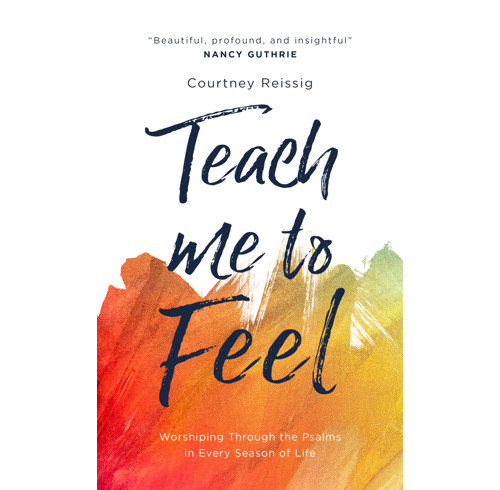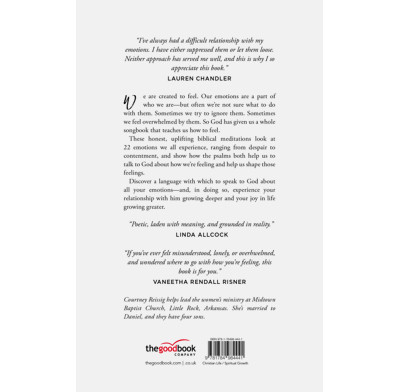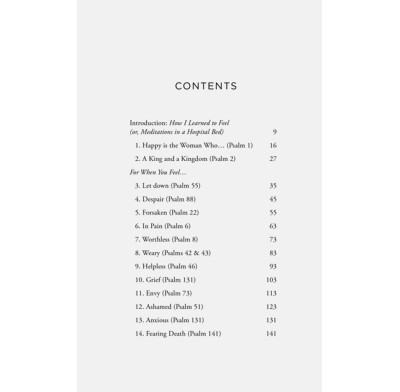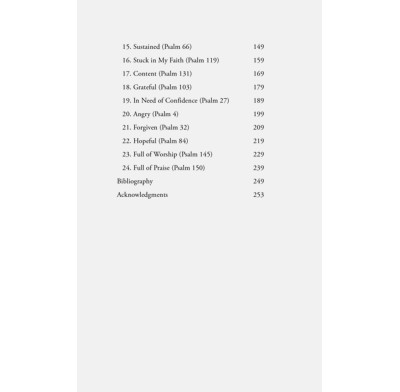📦 FREE shipping on orders over $30!




Meditations on the Psalms that help you to express your feelings to God in a biblical way.
Many of us suppress our feelings because we’re worried they are ungodly. Others of us are so led by our emotions that we let them dominate everything, including our faith.
In these honest, personal and uplifting meditations on 24 selected psalms, Courtney Reissig looks at emotions we all experience, ranging from shame, anxiety, and anger through to gratitude, hope, and joy. For each, she shows how the psalms give us permission to acknowledge how we feel before God, and how they can help us to use those feelings productively and faithfully.
This inspiring book will give you a language to cry out to God in order to process your feelings, as well as help you to grow in your faith. It can be used devotionally.
Introduction: How a Familiar Psalm Helped Me in My Fear
Includes Chapters For When You Feel…
Let down (Ps. 55)
Forgotten by God (Ps. 22)
Worthless (Ps. 8)
Grief (Ps. 31)
Envy (Ps. 73)
Anxious (Ps. 13)
Stuck Spiritually (Ps. 119)
Content (Ps. 131)
Grateful (Ps. 103)
Forgiven (Ps. 32)
Hopeful (Ps. 84)
| Contributors | Courtney Reissig |
|---|---|
| ISBN | 9781784985134 |
| Format | eBook |
| First published | December 2023 |
| Language | English |
| Publisher | The Good Book Company |
I’ve always had a difficult relationship with my emotions. I have suppressed them in shame, or I have let them loose with reckless abandon. Neither approach has served me well. This is why I appreciate Courtney Reissig’s newest offering, Teach Me How to Feel. Through her own wrestle with emotions, she points us to the place where the Lord taught her how to feel them—the Psalms. I found great comfort in her words and the insight she brings to these ancient songs. There’s nothing like a friend—modern or ancient—to tell us, “I’ve been there too.”
We know that God intends to change how we think and how we behave, but we don’t always expect that God intends to change how we feel. But, as Teach Me to Feel so beautifully shows, God has given us a whole book to guide us into feeling rightly. With profound insights tucked into short chapters, this book helps us as readers apply the words of the psalmists to our own souls—leading us into honesty with God, confidence in God, and joy with God.
I love the Psalms, and Courtney Reissig has made me cherish them even more. In Teach Me to Feel, she shows us how to honestly process our feelings with God, using psalms to express our deepest emotions. If you’ve ever felt misunderstood, lonely, or overwhelmed, and wondered how to biblically process your feelings, this book is for you. You’ll discover how to lament, find hope, and rejoice through all of life, drawing you closer to the God of all comfort.
This book is written specifically for women. Emotions are tricky things, they can override and take over or we can suppress them, neither is helpful.... continue reading
Teach Me to Feel is an in-depth look at 24 psalms. Reissig approaches 24 feelings or experiences common to all humans. She shows us how to meet God, communicate with, and praise Him through each of those feelings. The practice of communing with God in all feelings (not just the ones we want to feel) is a transformative practice, but sadly not one that has always been encouraged by the Western Church.
This book provides wisdom and hope, but most importantly it pushes the reader to open their Bible and find themselves in the Psalms. Regularly asking the question of how does God’s character and the delight in His word change us in each situation. One of my favorite lines from the book that displays this idea is “If you don't want to abandon him in despair in your greatest distress or turn from him in self-reliance in your greatest triumph, you're going to need the word.”
This is a book I recommend slowly unpacking over time and not rushing through.
I was provided this book by the publisher in exchange for my honest opinions.
Courtney Reissig explains that when she experienced her darkest moments, she found the psalms uniquely helpful. When she was dealing with pregnancy complications, fearing her own death and the death of her unborn child, the psalms spoke to her in a powerful way, helping her to process difficult emotions and worship in the midst of her pain and fear. Throughout this book, Reissig explores how Psalms speaks to readers in different seasons of life, and each chapter focuses on a different psalm and the primary emotion its expresses.
This book is like a hybrid between a devotional and a Bible study. The chapters are longer and more in-depth than a devotional reading, but are also simpler and more straightforward than a typical Bible study, since the reader does not have to contribute anything to the author’s full exposition.
This book can help readers connect with the psalms in a new way, and I appreciate how Reissig shares vulnerable reflections from her own life and includes a variety of possible applications for her readers. Many of her personal stories relate to motherhood, but she also includes examples and applications for women in different circumstances and life stages. However, I found it disappointing that Reissig only directed this book to women. The vast majority of this book involves spiritual truths that apply to the church at large, and men need the same wisdom and encouragement, even when illustrations would differ.
“Teach Me to Feel” is an encouraging guide to how viewing our experiences through the lens of Scripture can help us endure through suffering and keep our eyes on God through all of the different things that we feel. The author's many gendered references mostly limit this to a female audience, but the book is full of biblical wisdom and encouragement for dealing with a wide variety of feelings and types of experiences.
Note: I received a free copy from the publisher in exchange for an honest review.
This was not trite, nor was it cliche—two things I brace myself for when reading devotionals and books about the Psalms. Instead it was melodic and moving with just enough personal story to help the reader connect.
I started reading this book in an "unemotional" season—meaning, I didn't think I would really connect with it as much as I would if I was going through something challenging, etc. But I was wrong! This book is for those who "feel like they're all good," as well as for those going through their Valley of Baca. Stock this book in your home to turn to in joy, sorrow, and every emotion in between.
Thank you to The Good Book Company for sending me a copy in exchange for an honest review!
This book is great for helping one understand how the Psalms can be useful in each season you experience. Through the highs and lows, there are psalms that can be prayed, sung, read, ect. Reissig covers 23 different things you may feel/experience at one point or another and discusses Psalms in relation to that topic. I’d highly recommend having your Bible next to you as you read this book so you can read through the Psalm fully and can take advantage of the additional Psalm(s) she includes at the end of each chapter.
Reissig uses her experience as a woman and a mother to connect to the Psalms she discusses as well as the reader which allows for the book to feel very relatable.
At the end of each chapter there are reflection questions about the chapter and then an additional section to dig deeper through reading an additional Psalm listed at the end of the chapter and answering additional reflection questions. Again, have your Bible handy to get the most out of these sections!
Teach Me to Feel by Courtney Reissig is sub-titled Worshiping Through the Psalms in Every Season of Life. The psalms are among my favorite parts of the Bible maybe because I feel a little less crazy when I see some of the ups and downs of the psalmist's emotions. In Teach Me To Feel, Reissig shares some personal stories, her emotions that relate, and the psalms.
I like how down to earth this author is. I found this book to very easy to read and relate to. I have been through miscarriages and I had a fairly difficult time birthing my son, although my story is different than hers. The book starts off with her sharing this story and her tangled emotions. I could relate to a lot of what she wrote. She covers 22 emotions from grief and envy to pain and worthlessness throughout the book so actually there is a lot to relate to through the whole book. She also covers gratitude, contentment and hope. From one end of the spectrum to the other, I could relate to her stories in this book.
I also like how Reissig included discussion questions at the end of each chapter in Teach Me To Feel as well as ways to dig deeper. If you are interested in seeing how our emotions relate to the God of the Bible, I encourage you to give it a try. However, I don't think this is a book to just breeze through to get the most out of it. Rather it is one to work through as a Bible study or during your devotional time--either on your own or in a study group.
I received a copy of this book from the publisher. All opinions within this review are my own.
Love, love, loved this! Some chapters applied specifically to my life in this season, and I know I will refer back to this book in future seasons!
A quote I loved:
"In the Psalms, I wasn't only understood, but I also had language for my fears. In the Psalms, I had language for my distress. But in the Psalms, I also had language for God - I saw him for who he is, and I was able to trust him. The Psalms sustained me in my darkest moments...The Psalms taught me to feel the reality of life, in all its complexities, and they brought healing in the process."
I haven't always appreciated the Psalms. As with so much of scripture, the more you study and understand it, the more you come to love and cherish it. Over the past 2 years I have come back to the Psalms over and over and continually grow in my love for this book of the BIble.
Teach me to feel is a book about Worshipping Through the Psalms in Every Season of Life. The idea behind it is that the Psalms give us the language to express our feelings and emotions. We as Christian women often think very narrowly about how we are "supposed to feel". The Psalms show us that we were made to feel and that God can handle all of our big emotions.
"By seeing a particular feeling displayed in a particular psalm, you will be inviting God to teach you to feel. You will be letting him give you language to cry out to him or praise him, giving you a way to grow in your faith and through your feelings. God cares about every part of his image-bearers -- including our feelings."
There is another wonderful book I've read that is similar called Dark Clouds, Deep Mercy. That book only focuses on how the Psalms teach us to lament. I really enjoyed that this book covers other emotions found in Psalms.
I haven't finished the entire book, but I've loved what I've read! I have a plan to slowly read through the Psalms in 2024 and I want to save a few of the chapters to read as I go through the Psalms.
This book has felt like a gift from the Lord in a time when my emotions are somewhat all over the place at times. With three small children it can be difficult to find the time to really sit with God and let him know how we feel. To truly lament, share our frustrations or anger. These short chapters provide great food for thought, inspiration and biblical truth to help you and I come to God with how we feel.
Courtney takes you on a quick but thorough trip through the Psalms in order to show us how our range of emotions are nothing that we can't bring to God. This is a helpful book to reference as the highs & lows of life bring so many different feelings into our hearts. Some trials can feel isolating, but this book comes alongside you & guides you to Scripture where you can find the hope & strength & love of God.
Sometimes we let our feelings rule us. Other times we don't acknowledge our feelings and push them away, ashamed of how we feel. In her book, Teach Me to Feel, Courtney Reissig encourages us to bring our feelings to God and to be honest with Him. She walks us through 24 different emotions expressed throughout the Psalms and how to handle them biblically. She corrects our thinking and puts it into perspective, often pointing to Psalms 1 and 2. This book will definitely be one that I refer back to as I go through life's ups and downs.
"We will one day praise with everything we have in God's house forever. This is what gives us hope as we feel all sorts of things in the messy middle of life, and the messy middle of the Psalms."
Thank you @thegoodbookcompanyusa for providing me a free copy of this book in exchange for my honest review!